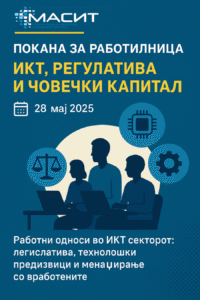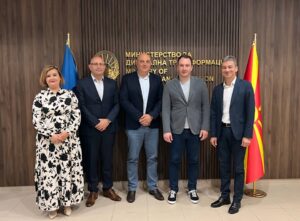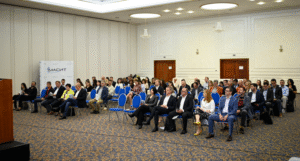Second Cycle of the ICT Workforce Requalification Project

At the beginning of March 2019, MASIT started to work on a second cycle of project for pre-qualification. This is a project that will carry out pre-qualification, which will include unemployed, where the interested candidates will have the opportunity to be trained in order to gain some other skills, knowledge and practical experience (beyond those who already have obtained) for IT profiles needed by ICT companies, which in the future could potentially be employed by ICT companies.
The ultimate goal of the project, after the completion and realization of the program, is for the people to be employed in ICT companies in ICT related positions.
The pre-qualification program lasts about 3 months, starting in March 2019
Through the pre-qualification process, the trainees gained theoretical and practical knowledge through many hands-on activities, worked on a specific project or case study that was upgraded from subject to subject, but also enriched their competencies with organizational culture and soft skills, which we have profiled them to be immediately ready for employment and productive engagement within IT companies.
Based on the results of the questionnaire completed by several IT companies and other potential employers, the Front – End web Developer program has been chosen, with emphasis on “react” technology as the most needed and most attractive need at the moment.
PARTICIPANTS IN THE PROGRAM
Program participants must have a minimum of a high school diploma, not older than 35, unemployed, have an interest and predisposition to pursue a career in ICT.
Potential candidates can also be graduates of any faculty other than electrical engineering and information technology faculties.
For candidates, the focus will be on people who have a mathematical and programming inclination and a logical way of thinking.
In order to successfully complete the project, it was necessary to carry out a complete recruitment and selection process of the most suitable candidates that would meet the qualification requirements for the training process.
Due to the specific needs of the project, the recruitment process was specifically designed for that purpose, yet it followed the basic principles of the company’s standard recruitment procedure and general recruitment standards.
PROGRAM PHASES
Phase 0: Obtaining Candidates’ Inputs (CVs) and Evaluation of Satisfaction of Basic Qualification Criteria in Training;
Phase 1: Testing for all candidates through a general knowledge test covering multiple components (English, logic, basic computer skills);
Phase 2: Oral interview of the shortlisted candidates;
Phase 3: Profiling Test for Closer Candidates;
Phase 4: Defining the target group (Final selection based on the first two criteria);
Phase 5: Conducting the training (training is planned to be held in the afternoon and at the weekend);
Phase 6: Checking the knowledge gained through self-development of a project or case study and other type of testing to monitor the progress of the candidates;
Phase 7: Any candidate who fails to find a job immediately after completing the training after 01.06.2019 will be offered internships in one of the ICT companies in the country.
Donor: USAID REG;
Partners: Brainster as a training provider.
News

Greater global breakthrough of the Macedonian ICT sector
MASIT at a meeting with the Ministry of Foreign Affairs The Chamber of Commerce for Information and Communication Technologies – MASIT is embarking on a new chapter and partnership with the Ministry of Foreign Affairs of the Republic of North Macedonia. This partnership aims to provide more intensive and constructive support to the Macedonian ICT sector. The collaboration is focused on enhancing the international visibility of the domestic ICT sector, creating conditions for entering new export markets, and better positioning Macedonian companies in the global economy. Through joint activities, participation in major international fairs, conferences, and business forums, as well as by establishing new channels to connect with the Macedonian diaspora and foreign investors, the initiative is expected to create tangible opportunities for growth and development for MASIT member companies. Within the framework of this collaboration, plans include organizing business delegations and direct meetings with potential partners abroad, preparing modern promotional materials, as well as initiatives to establish representative offices of Macedonian ICT companies in strategic markets. Additionally, initiatives for knowledge and technology transfer will be developed to contribute to enhancing the capacities of domestic companies. MASIT President, Mr. Jordan Dimitrovski, emphasized that the Chamber is strategically focused on providing long-term support and achieving an international breakthrough for companies in this industry, with a clear goal of creating conditions for sustainable growth and entry into new markets through partnerships and strategic initiatives. Minister of Foreign Affairs, Mr. Timcho Mucunski, highlighted that the Ministry is fully available to support the implementation of all future activities and initiatives that will enhance the competitiveness of Macedonian ICT companies and enable their more effective positioning in the global market. Through this partnership, MASIT strengthens its role as an active partner and supporter of its member companies in their internationalization process, contributing to a stronger positioning of the Republic of North Macedonia on the global ICT map.
15. 09. 2025y.

“ICT, Regulation and Human Capital”
Employment Relations in the ICT Sector: Legislation, Technological Challenges, and Workforce Management MASIT Organizes a Specialized Workshop on Employment Relations in the ICT Sector: Legislation, Technological Challenges, and Workforce Management MASIT is organizing a specialized workshop dedicated to the current challenges related to the application of the Employment Relations Act (ERA) in the ICT industry. The event will take place at the premises of our patron partner, Halkbank – Directorate 2, where a productive discussion will be opened with relevant representatives from institutions, university professors, and the business community. Key objectives of the workshop include: Analyzing the practical application of the ERA in the context of the ICT industry; Opening a dialogue on challenges related to workforce turnover as a result of automation and artificial intelligence; Sharing best practices for digitalized HR processes; Initiating a discussion on the need for a sectoral approach in regulating employment relations in ICT. The program includes: Panel discussions with representatives from the Government, legal experts, university professors, HR professionals, and ICT companies; Discussions on the most relevant provisions of the ERA affecting the ICT sector; Topics on employment contracts, remote work, bonuses, and leave policies; Legal aspects related to “technological redundancies” and the use of AI in companies; Practical examples of digitalized HR practices; Joint proposals for initiatives and potential legislative amendments in the context of the ICT industry. We anticipate significant participation from MASIT members, fostering a constructive exchange of experiences and proposals for improving regulations in line with the realities of the ICT labor market. Agenda 📍 Location: Halkbank🗓️ Date and Time: 28.05.2025, 09:00 – 13:00 The event is supported by HALKBANK AD as MASIT’s Patron Partner and is free of charge for the Chamber’s members. Новости Сите новости
22. 07. 2025y.

Meeting with the Minister of Digital Transformation
Common Priorities Set The Board of Directors of MASIT held a productive meeting with the Minister of Digital Transformation, Mr. Stefan Andonovski. The meeting was an excellent opportunity to deepen the collaboration between the Ministry and the Chamber, as well as to align priorities and visions for the further development of the ICT sector in the country. Minister Andonovski extended his sincere congratulations to the newly elected members of the MASIT Board of Directors and the President, emphasizing the importance of continuity and the Chamber’s ongoing work as a relevant and active partner to institutions. “MASIT is a great friend of the Ministry of Digital Transformation, and we will continue that way in the future,” stated the Minister, adding that joint activities will continue with increased intensity in areas such as digitalization, the economic potential of technology, modernization of public and private processes, development and application of artificial intelligence, and strengthening cybersecurity capacities. MASIT highlighted the key priorities of the new leadership – creating conditions for sustainable growth of the ICT industry, improving the business climate, boosting exports and internationalization of domestic ICT companies, and systemic support for digital skills and human capital. Both sides emphasized the importance of close and transparent communication, timely exchange of information, and the initiation of concrete measures and policies that will deliver real results for businesses, institutions, and citizens. The meeting served as confirmation of a joint commitment to building a digitally mature, resilient, and competitive society – a goal that requires collaboration, partnership, and a shared vision. News All news
25. 07. 2025y.

MASIT Held Its 19th Regular Annual Electoral Assembly
A new executive board has been appointed for the 2025–2028 term The Chamber of Commerce for Information and Communication Technologies – MASIT, Skopje, held its 19th regular Annual General Assembly on May 8, 2025, at the Alexander Palace Hotel, during which the new leadership of the Chamber was elected for the 2025–2028 mandate. At the regular General Assembly, Ilija Gospodinov from Endava was elected as the new President of the MASIT Assembly. Additionally, new members of the Management Board, Supervisory Board, and Court of Honor of the Chamber were elected. Members of the MASIT Management Board: Jordan Dimitrovski, Aitonix – President of MASIT Blagoj Hristov, Makedonski Telekom Dragan Chepujnoski, A1 Macedonia Damjan Manchevski, MAK-System Sofche Jovanovska, Scale Focus Vesna Ivanoska, Avenga Academy Kostandina Pareska Medarski, Valtech Filip Petrovski, Data Masters Zoran Lazarevski, Ultra Members of the MASIT Supervisory Board: Goran Mitev, Edusoft Mile Stoilovski, Bransys Marijana Andrić, Marand Members of the MASIT Court of Honor: Dashmir Istrefi, Hoyo Tech Sasho Jovanovski, Datalab Jana Damevska, Infigo На конститутивната седница на Управниот одбор на МАСИТ, која се одржа на 15ти мај 2025 година, г. Јордан Димитровски, експерт за развој на бизнис, сопственик и генерален директор на компанијата „Аитоникс“ беше избран за Претседател на Управниот одбор на МАСИТ за мандатниот период 2025–2028. Компанијата Аитоникс е високо етаблирана и добро позната во ИКТ индустријата, а оваа година одбележува 25 години успешно работење во Македонија. Веруваме дека изборот на г. Димитровски носи нова енергија, фокус на конкретни резултати и посветеност на јакнењето на улогата на ИКТ секторот во националниот развој.At the inaugural session of the MASIT Management Board, held on May 15, 2025, Mr. Jordan Dimitrovski, business development expert and owner and CEO of Aitonix, was elected President of the MASIT Management Board for the 2025–2028 mandate. Aitonix is a highly established and well-known company in the ICT industry, celebrating 25 years of successful operation in North Macedonia this year. We believe that the election of Mr. Dimitrovski brings new energy, a focus on concrete results, and a strong commitment to strengthening the role of the ICT sector in national development. In accordance with the latest amendments to the MASIT Statute, the role of President of the Management Board also serves as the President of the Chamber, including the responsibilities of the official representative of the Chamber before institutions, partners, and the public. This positions the role as key to the future leadership and representation of MASIT. We look forward to a period marked by enhanced collaboration among members, a proactive role of the Chamber in policy-making, and concrete steps toward the digital transformation and internationalization of Macedonian ICT companies. We congratulate the new President, Mr. Dimitrovski, and wish him a successful, dynamic, and inspiring mandate! Новости Сите новости
21. 07. 2025y.

MASIT held a professional workshop on the topic “ICT, Regulation, and Human Capital”
Organized by the Chamber of Commerce for Information and Communication Technologies – MASIT, on May 28 a specialized working meeting was held on the topic “ICT, Regulation, and Human Capital,” focusing on key challenges faced by the ICT sector in terms of regulation, human capital, and technological changes. The event brought together relevant representatives from institutions, the business sector, and academia. The first panel discussion featured Mr. Gjoko Velkovski, Deputy Minister for Social Policy, Demography and Youth, Mr. Lazar Jovevski, university professor and advisor to the Prime Minister on labor and social policy, Mr. Mladen Frchkoski, Head of the Labor Market Department at the Ministry of Economy and Labor, and Mr. Jordan Dimitrovski, President of MASIT, who in his address emphasized that the Chamber remains a strong advocate for the interests of the ICT industry and will intensify efforts to create a fair, predictable, and modern regulatory framework that supports digital transformation and the development of human capital as a key ICT sector resource. The legal aspect of the current regulations and the challenges faced by ICT companies were thoroughly addressed by Mr. Jovan Najdenovski — lawyer and long-time legal representative of MASIT. We are especially pleased that attendees had the opportunity to hear first-hand about the complexity of the everyday legal challenges ICT companies face. Professional insights and practical experiences were also shared by Ms. Nevena Meshko from Mak System, Ms. Ana Zakovska from ITLabs, and Ms. Dina Ivanovic from Prohiad SEE, each with significant roles in human resources, labor relations, and legal regulation within their companies. The discussion was enriched with valuable perspectives from other sectors as well, thanks to Ms. Kristina Spiroska from Halkbank, Mr. Slavko Sazdovski from Triglav Life Insurance, and Mr. Dejan Pavleski from Semos, who shared their practical experiences from the banking and insurance industries. Among the key topics discussed were the application of the Labor Law in the context of flexible work models, the legal and practical implications of automation and artificial intelligence, digitization of HR processes, and the need for new internal regulations related to working from home or abroad — i.e., remote work. The closing segment highlighted specific conclusions and recommendations for further action. One of the key outcomes of the event was the initiative to form a MASIT working group to propose amendments to the Labor Law in line with the ICT industry’s specific needs. It was also proposed to organize thematic roundtables including all relevant stakeholders — institutions, companies, and experts — to align regulation with current conditions and needs. The event was held at Halkbank‘s premises, a patron partner of MASIT, whose support and hospitality were essential for the successful organization of the meeting. MASIT remains committed to improving the business environment for ICT companies and advocating for industry interests during the creation and adaptation of the legal framework. Through collaboration, expertise, and an integrated approach, MASIT will continue leading the dialogue for a better future for the ICT sector in Macedonia. Новости Сите новости
23. 07. 2025y.

POSTPONED: Celebration of MASIT’s 25-Year Anniversary Jubilee
Новости Сите новости
20. 07. 2025y.